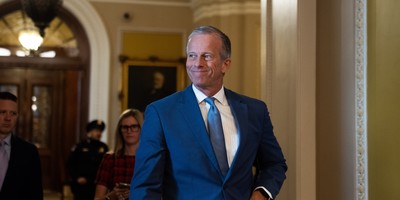WASHINGTON -- A new Capitol Visitor Center recently opened, just in time for the transformation of the Capitol building into a tomb for the antiquated idea that the legislative branch matters. The center is supposed to enhance the experience of visitors to Congress, although why there are visitors is a mystery.
Congress' marginalization was brutally underscored when, after Congress did not authorize $14 billion for General Motors and Chrysler, the executive branch said, in effect: Congress' opinions are mildly interesting, so we will listen very nicely -- then go out and do precisely what we want.
Friday the president gave the two automakers access to money Congress explicitly did not authorize. More money -- up to $17.4 billion -- than had been debated, thereby calling to mind Winston Churchill on naval appropriations: "The Admiralty had demanded six ships: the economists offered four: and we finally compromised on eight."
The president is dispensing money from the $700 billion Congress provided for the Troubled Asset Relief Program. The unfounded assertion of a right to do this is notably brazen, given the indisputable fact that if Congress had known that TARP -- supposedly a measure for scouring "toxic"
assets from financial institutions -- was to become an instrument for unconstrained industrial policy, it would not have been passed.
If TARP funds can be put to any use the executive branch fancies because TARP actually is a blank check for that branch, then the only reason no rules are being broken is that there are no rules. This lawlessness tarted up as law explains the charade of Vice President Dick Cheney warning Republican senators that if they did not authorize the $14 billion, the GOP would again be regarded as the party of Herbert Hoover.
Recommended
Surely Cheney, a disparager of Congress and advocate of extravagant executive prerogatives, knew that the president considered the Senate's consent irrelevant.
Evidence that casualness about legality is inherent in big government is found in H.W. Brands' new biography "A Traitor to His Class: The Privileged Life and Radical Presidency of Franklin Delano Roosevelt." FDR became president on Saturday, March 4, 1933. Banks were closed that day and the next, temporarily preventing panicked depositors from withdrawing their money. At 1 a.m. Monday, FDR ordered all banks closed for four days, hoping that the fever would break. His act may have been prudent. But was it legal? Brands writes:
"He cited a section of the 1917 Trading with the Enemy Act as justification. The act had never been formally repealed, but a body of legal theory held that the law, along with other wartime legislation, had expired upon the signing of the peace treaty with Germany in 1921."
FDR had asked the opinion of his as-yet-unconfirmed attorney general, Montana Sen. Thomas Walsh, who gave the answer FDR wanted. Walsh never had to defend this: He died March 2 en route to the inauguration.
The expansion of government entails an increasingly swollen executive branch and the steady enlargement of executive discretion. This inevitably means the eclipse of Congress and attenuation of the rule of law.
For decades, imperatives of wars hot and cold, and the sprawl of the regulatory state, have enlarged the executive branch at the expense of the legislative. For eight years, the Bush administration's "presidentialists"
have aggressively wielded the concept of the "unitary executive" -- the theory that where the Constitution vests power in the executive, especially power over foreign affairs and war, the president is immune to legislative abridgements of his autonomy.
The administration has not, however, confined its aggrandizement of executive power to national security matters. According to former Rep.
Mickey Edwards in his book "Reclaiming Conservatism," the president has issued "signing statements" designating 1,100 provisions of new laws -- more designations than have been made by all prior presidents combined -- that he did not consider binding on him or any other executive branch official.
Still, most of the administration's executive truculence has pertained to national security, where the case for broad prerogatives, although not as powerful as the administration supposes, is at least arguable. With the automakers, however, executive branch overreaching now extends to the essence of domestic policy -- spending -- and traduces a core constitutional principle, the separation of powers.
Most members of the House and Senate want the automakers to get the money, so they probably are pleased that the administration has disregarded Congress's institutional dignity. History, however, teaches that it is difficult for Congress to be only intermittently invertebrate.

























Join the conversation as a VIP Member